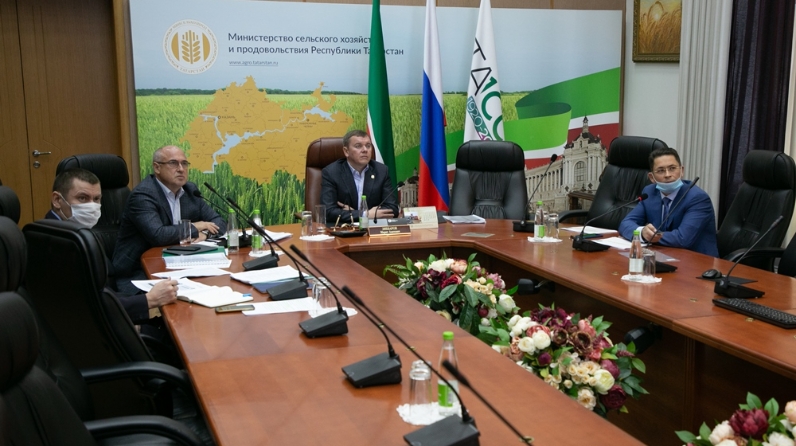Marat Zyabbarov discussed plans for further development in crop production

Today, the Ministry of Agriculture and Food of the Republic of Tatarstan hosted a meeting in the "Hour of Control" format with major investors in the crop production industry. Deputy Prime Minister of the Republic of Tatarstan - Minister of Agriculture and Food of Tatarstan Marat Zyabbarov heard the investors of such agricultural enterprises as Agroholding Krasny Vostok Agro, Agrofirma Rodnye Kray - Tugan Yak LLC and Chistai-Agro LLC about the preliminary results of the year and plans for the coming year. The meeting was also attended by heads of agricultural departments from the districts where the enterprises operate.
The economic indicators of the work of agricultural enterprises, the structure of sown areas, winter and fodder wedge, the state and plans for the renewal of perennial grasses, the provision of seeds, work with fallow, agrochemical soil surveys and plans for liming and applying mineral fertilizers were attentively analyzed.
Adel Khairullin, General Director of the Krasny Vostok Agro Agroholding, reported that the agricultural holding's arable land area covers 211.4 thousand hectares. Lands are cultivated in Alkeevsky, Alekseevsky, Spassky, Verkhneuslonsky, Nurlatsky, Rybno-Slobodsky, Zelenodolsky, Kamsko-Ustinsky and Chistopolsky districts. The area under crops of grain and leguminous crops in 2021 is planned to increase from 84.5 thousand hectares to 86.1 thousand hectares. It is also planned to sow 8550ha with green manure crops (15% of the steam), renewal of seed material (640 tons), sow perennial grasses on 3690 hectares, (20% of the area of many herbs), liming acidic soils 8300 hectares, (10% of acidic soils ), application of mineral fertilizers 70 kg a.i. / ha, construction of 7 stationary mortar units and production of 316,905 tonnes of grain units, 31 kg / ha (+ 7% by 2020).
LLC "Agrofirma Rodnoy krai - Tugan Yak" is part of the structure of JSC "Chelny-Khleb", which is a full-cycle enterprise and manufactures products according to the principle "from field to counter". The deputy director of the enterprise, Eduard Yunusov, said that the agricultural firm is processing 18 thousand hectares of arable land in the Muslyumovsky, Sarmanovsky and Menzelinsky regions. The enterprise aims to preserve grain and leguminous crops in the same volume in 2021 and a slight increase in industrial crops from 2017 ha to 2,506 in 2021, mainly due to an increase in rapeseed crops from 853 to 1406 ha. Also in the plans of the agricultural enterprise is the sowing of green manure crops (694 hectares, 24% of the fallow), the renewal of seed material (352 tons), the sowing of perennial grasses (248 hectares, 23% of the area of herbs), liming of acidic soils (1000 hectares, 14.5 % of acidic soils), purchase of self-propelled sprayers, a sowing complex (1 unit), combine harvesters - 4 units, application of mineral fertilizers (85 kg a.i. / ha), construction of a stationary mortar unit and production of 55124 tons of grain units, 36.2 centners / ha (+3.24 c / ha by 2020).
Director of Chistai-Agro LLC Rafagat Aliullov reported that the enterprise cultivates 24.8 thousand hectares of arable land. The enterprise plans to reduce the area of grain crops and increase the area of flax from 722 to 2,700 hectares and maize from 1,350 to 1,845, and when growing cereals, more attention will be paid to winter crops. In addition, it is planned to sow green manure crops on 3,000 hectares (100% of the fallow), renewal of seed material (50 tons), sow perennial grasses on 500 hectares, (15% of the area of many herbs), liming acidic soils on 1,000 hectares, (17 % of acidic soils), the introduction of mineral fertilizers 80 kg a.i. / ha, the construction of a stationary mortar unit and the production of 65,517 tons of grain units, 30.0 c / ha (± 1.9 by 2020).
The Ministry of Agriculture and Food of the Republic of Tatarstan plans to hold a series of meetings in the "Hour of Control" format with investors and agricultural enterprises operating in Tatarstan. This format of interaction allows to quickly exchange information about the current situation in the regions, identify issues that need to be resolved and bring the priorities of the industry development to farmers. The Ministry takes into account the proposals of agricultural producers in the formation of additional measures of state support for the agro-industrial complex.